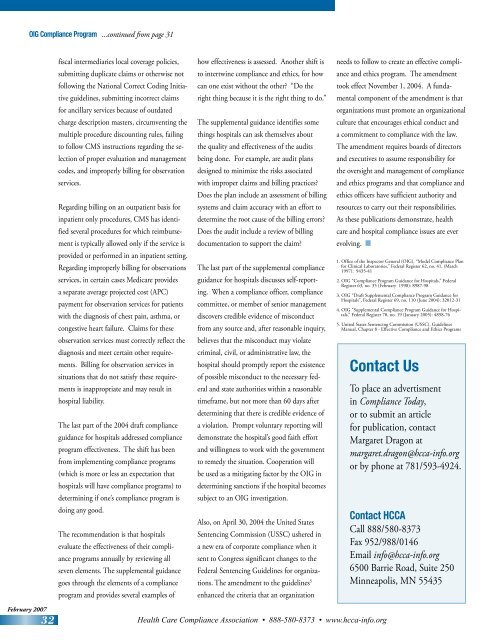Mildred L. Johnson, JD, CPC - Health Care Compliance Association
Mildred L. Johnson, JD, CPC - Health Care Compliance Association
Mildred L. Johnson, JD, CPC - Health Care Compliance Association
You also want an ePaper? Increase the reach of your titles
YUMPU automatically turns print PDFs into web optimized ePapers that Google loves.
OIG <strong>Compliance</strong> Program ...continued from page 31<br />
fiscal intermediaries local coverage policies,<br />
submitting duplicate claims or otherwise not<br />
following the National Correct Coding Initiative<br />
guidelines, submitting incorrect claims<br />
for ancillary services because of outdated<br />
charge description masters, circumventing the<br />
multiple procedure discounting rules, failing<br />
to follow CMS instructions regarding the selection<br />
of proper evaluation and management<br />
codes, and improperly billing for observation<br />
services.<br />
Regarding billing on an outpatient basis for<br />
inpatient only procedures, CMS has identified<br />
several procedures for which reimbursement<br />
is typically allowed only if the service is<br />
provided or performed in an inpatient setting.<br />
Regarding improperly billing for observations<br />
services, in certain cases Medicare provides<br />
a separate average projected cost (APC)<br />
payment for observation services for patients<br />
with the diagnosis of chest pain, asthma, or<br />
congestive heart failure. Claims for these<br />
observation services must correctly reflect the<br />
diagnosis and meet certain other requirements.<br />
Billing for observation services in<br />
situations that do not satisfy these requirements<br />
is inappropriate and may result in<br />
hospital liability.<br />
The last part of the 2004 draft compliance<br />
guidance for hospitals addressed compliance<br />
program effectiveness. The shift has been<br />
from implementing compliance programs<br />
(which is more or less an expectation that<br />
hospitals will have compliance programs) to<br />
determining if one’s compliance program is<br />
doing any good.<br />
The recommendation is that hospitals<br />
evaluate the effectiveness of their compliance<br />
programs annually by reviewing all<br />
seven elements. The supplemental guidance<br />
goes through the elements of a compliance<br />
program and provides several examples of<br />
how effectiveness is assessed. Another shift is<br />
to intertwine compliance and ethics, for how<br />
can one exist without the other? “Do the<br />
right thing because it is the right thing to do.”<br />
The supplemental guidance identifies some<br />
things hospitals can ask themselves about<br />
the quality and effectiveness of the audits<br />
being done. For example, are audit plans<br />
designed to minimize the risks associated<br />
with improper claims and billing practices?<br />
Does the plan include an assessment of billing<br />
systems and claim accuracy with an effort to<br />
determine the root cause of the billing errors?<br />
Does the audit include a review of billing<br />
documentation to support the claim?<br />
The last part of the supplemental compliance<br />
guidance for hospitals discusses self-reporting.<br />
When a compliance officer, compliance<br />
committee, or member of senior management<br />
discovers credible evidence of misconduct<br />
from any source and, after reasonable inquiry,<br />
believes that the misconduct may violate<br />
criminal, civil, or administrative law, the<br />
hospital should promptly report the existence<br />
of possible misconduct to the necessary federal<br />
and state authorities within a reasonable<br />
timeframe, but not more than 60 days after<br />
determining that there is credible evidence of<br />
a violation. Prompt voluntary reporting will<br />
demonstrate the hospital’s good faith effort<br />
and willingness to work with the government<br />
to remedy the situation. Cooperation will<br />
be used as a mitigating factor by the OIG in<br />
determining sanctions if the hospital becomes<br />
subject to an OIG investigation.<br />
Also, on April 30, 2004 the United States<br />
Sentencing Commission (USSC) ushered in<br />
a new era of corporate compliance when it<br />
sent to Congress significant changes to the<br />
Federal Sentencing Guidelines for organizations.<br />
The amendment to the guidelines 5<br />
enhanced the criteria that an organization<br />
needs to follow to create an effective compliance<br />
and ethics program. The amendment<br />
took effect November 1, 2004. A fundamental<br />
component of the amendment is that<br />
organizations must promote an organizational<br />
culture that encourages ethical conduct and<br />
a commitment to compliance with the law.<br />
The amendment requires boards of directors<br />
and executives to assume responsibility for<br />
the oversight and management of compliance<br />
and ethics programs and that compliance and<br />
ethics officers have sufficient authority and<br />
resources to carry out their responsibilities.<br />
As these publications demonstrate, health<br />
care and hospital compliance issues are ever<br />
evolving. n<br />
1. Office of the Inspector General (OIG), “Model <strong>Compliance</strong> Plan<br />
for Clinical Laboratories,” Federal Register 62, no. 41, (March<br />
1997): 9435-41<br />
2. OIG “<strong>Compliance</strong> Program Guidance for Hospitals,” Federal<br />
Register 63, no. 35 (February 1998): 8987-98<br />
3. OIG “Draft Supplemental <strong>Compliance</strong> Program Guidance for<br />
Hospitals”, Federal Register 69, no. 110 (June 2004): 32012-31<br />
4. OIG “Supplemental <strong>Compliance</strong> Program Guidance for Hospitals,”<br />
Federal Register 70, no. 19 (January 2005): 4858-76<br />
5. United States Sentencing Commission (USSC), Guidelines<br />
Manual, Chapter 8 - Effective <strong>Compliance</strong> and Ethics Programs<br />
Contact Us<br />
To place an advertisment<br />
in <strong>Compliance</strong> Today,<br />
or to submit an article<br />
for publication, contact<br />
Margaret Dragon at<br />
margaret.dragon@hcca-info.org<br />
or by phone at 781/593-4924.<br />
Contact HCCA<br />
Call 888/580-8373<br />
Fax 952/988/0146<br />
Email info@hcca-info.org<br />
6500 Barrie Road, Suite 250<br />
Minneapolis, MN 55435<br />
February 2007<br />
32<br />
<strong>Health</strong> <strong>Care</strong> <strong>Compliance</strong> <strong>Association</strong> • 888-580-8373 • www.hcca-info.org

















